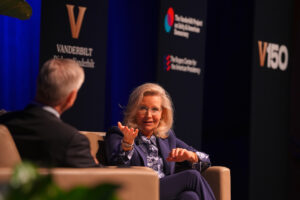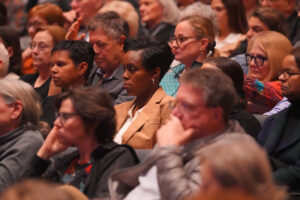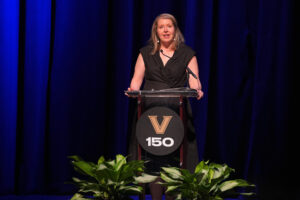New center launches, leading the conversation on the American presidency
The Carolyn T. and Robert M. Rogers Center for the American Presidency has launched, with the goal of exploring the presidency through an innovative, comprehensive lens. Housed within the College of Arts and Science, the center will serve as a nationally recognized hub for innovative scholarship about the workings of the presidency.

On February 6, the center hosted its inaugural event, an exclusive conversation between former U.S. Rep. Liz Cheney and Jon Meacham, Carolyn T. and Robert M. Rogers Chair and distinguished visiting professor of political science. More than 1,000 people attended to hear Cheney’s insights from her congressional campaign, her first-hand perspective on the Jan. 6, 2021 attack on the Capitol, and the ensuing Congressional investigation.
The event sets the tone for what will become a steady cadence of  thought-provoking dialogue to both explore and promote understanding of the American presidency. Through outreach and research efforts, the center takes a new approach to examining the presidency, one that takes into account the relationship between the people and the nation’s highest office.
thought-provoking dialogue to both explore and promote understanding of the American presidency. Through outreach and research efforts, the center takes a new approach to examining the presidency, one that takes into account the relationship between the people and the nation’s highest office.
“The presidency is a central and powerful force in U.S. politics and life, and it has been shaped by a range of activists and ordinary people—people who may have never seen someone who looks like themselves in the Oval Office,” said Nicole Hemmer, director of the Carolyn T. and Robert M. Rogers Center for the American Presidency and associate professor of history. “The Rogers Center will study and explore the power of the presidency, and how that power is amplified and constrained by legal rules, political norms, movements, events, and the public.”

Hemmer is a renowned political historian specializing in media, conservatism, and the presidency. Her scholarship and teaching focuses on the interplay of social movements, electoral politics, and political culture to probe the complexities of political identity and practice in the United States.
In addition to her scholarship, Hemmer writes regularly for a number of national and international outlets and is frequently sought out by media as an expert on the presidency.
The center was established through a $5 million gift from alumni Carolyn Thomas Rogers, BA’75, and Robert Moss Rogers, BA’75. Their gift contributes to the $3.2 billion Dare to Grow campaign, the most ambitious fundraising effort in Vanderbilt’s history.
“We are deeply thankful for the Rogers family commitment to this important area of scholarship,” said Timothy P. McNamara, interim dean of the College of Arts and Science. “The center will play a critical role—both on Vanderbilt’s campus and around the country— in shaping our conversations about, and understanding of, the American presidency.”
In addition to frequent on-campus events, the center will offer research grants, works-in-progress seminars, and conferences. Upcoming programming includes:
- February 20: Samuel Freedman: The Rogers Center and the Vanderbilt Project on Unity and American Democracy are partnering to bring journalist and historian Samuel Freedman to campus to give a book talk on his new release, Into the Bright Sunshine: Young Hubert Humphrey and the Fight for Civil Rights. (5:00-6:00 p.m., location TBD)
- February 28: Melissa Estes-Blair: Presidential historian Melissa Estes-Blair (Auburn University) will be giving a talk on her book, Bringing Home the White House: The Hidden History of the Women who Shaped the Presidency in the 20th Century, which will be followed by a book-signing. (5:00 p.m., Central Library Community Room)
- March 28: Rebecca Traister: This event will feature abortion rights activist and author Rebecca Traister in conversation with Nicole Hemmer. (5:00 p.m., Central Library Community Room, will be recorded)
By hosting leading scholars with a wide range of expertise, Hemmer envisions the center playing a central role in fostering discussions that look at the presidency as both an institution and an idea.
“The past few years have shown us how fluid and contested the powers of the presidency are,” Hemmer said. “We need a better understanding of how those powers have developed over time in order to make sense of the challenges we’re facing today.”
